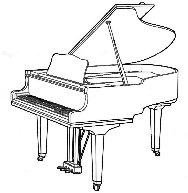
Alex Fender © Fender Piano Services 2013 - 2019

Welcome to
Tel: 0800 233 5440 - Mobile: 07725 120137
Free-phone number!

Some advice on buying a piano
A piano will enhance any home and give enormous pleasure for a lifetime. Whether you are a serious musician or just want to play the piano for fun, it is vitally important that you get a piano that will last and sound good. It’s a false economy to ‘pick up a cheapy’ if you want it to last and don’t want to spend a fortune keeping it working! Here is some help
I often have people ask if I know of any cheap pianos for sale as “It’s only for the kids to learn on”. This comment makes me cringe! There is nothing more off putting than an instrument that sounds awful and notes don’t work properly. When was the last time you saw a driving instructor roll up in a 30 year old banger with bits hanging off? It’s the same with learning the piano - you need a decent instrument. Sure you can get a piano from an internet auction site for £50 and you might be really lucky, but the chances are you will have 50 quids worth of fire wood!
You will have already decided if you want an upright or a grand piano so find a decent piano shop and spend some time trying lots of pianos. Always buy as new a piano as you can afford, pianos are not like violins, they deteriorate with age. Avoid the very smallest grands as you will get a far better sound from a larger upright as the soundboard will be larger on the upright.
If you are going for a brand new piano, or a used one try and set yourself a realistic budget - many dealers offer interest free credit so use it! Better your money stays in your account than theirs! When you go to the shop don’t be afraid to take some sheet music with you to play but, take a tune that you can play well - you want to concentrate on the feel and sound of the piano rather than the dots on the page. Play the same tune on every piano, that way you will easily hear and feel the difference between each one.
How does the action feel - too heavy, too light? Sluggish or really fast? The important thing here is that the feel needs to be right for you and not just for the salesman.
Listen carefully to the very top and the very bottom of the piano, is the top woody and lacking sound? Is the bass end ‘thumpy’ and lacking sustain? Try and get one with a good sound across the whole keyboard.
I often hear people talk about the harshness of some new pianos (quite often Yamaha pianos), they are actually intended to be like this so that once the piano is in the home the sound can be altered to suit the environment and the player. It is far easier to make a harsher piano more mellow than the other way around. More about this ‘voicing’ here.
If you are looking at an older piano make sure it’s on pitch (the A above the middle C should be on 440Hz). Take along a tuning fork or if you have a smartphone, download a tuner app, that way you can easily check the pitch. If it is really flat ask why - often it’s a sign that the tuning plank is worn out and a piano that cant be tuned to pitch is as much good as a broken window.
I can’t emphasise this enough - get a piano technician to look over the piano and
give you their opinion. Ideally you want the piano to last a lifetime so a little
spent now could save you a fortune later!
One important factor often forgotten about is finding a teacher, you can pick out a tune yourself using a tutor book but you will not progress anywhere nearly as quickly without some proper lessons. It’s vital to learn good technique early on as this will increase your enjoyment no end and pay dividends later!

